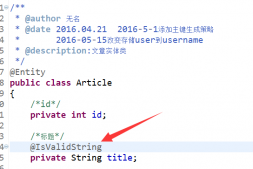注解(Annotations)是JUnit的标志性技术,本文就来对它的20个注解,以及元注解和组合注解进行学习。
20个注解
在org.junit.jupiter.api包中定义了这些注解,它们分别是:
@Test 测试方法,可以直接运行。
@ParameterizedTest 参数化测试,比如:
|
1
2
3
4
5
|
@ParameterizedTest@ValueSource(strings = { "racecar", "radar", "able was I ere I saw elba" })void palindromes(String candidate) { assertTrue(StringUtils.isPalindrome(candidate));} |
@RepeatedTest 重复测试,比如:
|
1
2
3
4
|
@RepeatedTest(10)void repeatedTest() { // ...} |
@TestFactory 测试工厂,专门生成测试方法,比如:
|
1
2
3
4
5
6
7
8
9
|
import org.junit.jupiter.api.DynamicTest;@TestFactoryCollection<DynamicTest> dynamicTestsFromCollection() { return Arrays.asList( dynamicTest("1st dynamic test", () -> assertTrue(isPalindrome("madam"))), dynamicTest("2nd dynamic test", () -> assertEquals(4, calculator.multiply(2, 2))) );} |
@TestTemplate 测试模板,比如:
|
1
2
3
4
5
6
7
8
9
10
11
12
13
14
15
16
17
18
19
20
21
22
23
|
final List<String> fruits = Arrays.asList("apple", "banana", "lemon");@TestTemplate@ExtendWith(MyTestTemplateInvocationContextProvider.class)void testTemplate(String fruit) { assertTrue(fruits.contains(fruit));}public class MyTestTemplateInvocationContextProvider implements TestTemplateInvocationContextProvider { @Override public boolean supportsTestTemplate(ExtensionContext context) { return true; } @Override public Stream<TestTemplateInvocationContext> provideTestTemplateInvocationContexts( ExtensionContext context) { return Stream.of(invocationContext("apple"), invocationContext("banana")); }} |
@TestTemplate必须注册一个TestTemplateInvocationContextProvider,它的用法跟@Test类似。
@TestMethodOrder 指定测试顺序,比如:
|
1
2
3
4
5
6
7
8
9
10
11
12
13
14
15
16
17
18
19
20
21
22
23
24
25
26
27
|
import org.junit.jupiter.api.MethodOrderer.OrderAnnotation;import org.junit.jupiter.api.Order;import org.junit.jupiter.api.Test;import org.junit.jupiter.api.TestMethodOrder;@TestMethodOrder(OrderAnnotation.class)class OrderedTestsDemo { @Test @Order(1) void nullValues() { // perform assertions against null values } @Test @Order(2) void emptyValues() { // perform assertions against empty values } @Test @Order(3) void validValues() { // perform assertions against valid values }} |
@TestInstance 是否生成多个测试实例,默认JUnit每个测试方法生成一个实例,使用这个注解能让每个类只生成一个实例,比如:
|
1
2
3
4
5
6
7
8
9
10
11
12
13
14
15
16
|
@TestInstance(Lifecycle.PER_CLASS)class TestMethodDemo { @Test void test1() { } @Test void test2() { } @Test void test3() { }} |
@DisplayName 自定义测试名字,会体现在测试报告中,比如:
|
1
2
3
4
5
6
7
8
9
10
11
12
13
14
15
16
17
18
19
20
21
22
|
import org.junit.jupiter.api.DisplayName;import org.junit.jupiter.api.Test;@DisplayName("A special test case")class DisplayNameDemo { @Test @DisplayName("Custom test name containing spaces") void testWithDisplayNameContainingSpaces() { } @Test @DisplayName("╯°□°)╯") void testWithDisplayNameContainingSpecialCharacters() { } @Test @DisplayName("
延伸 · 阅读
精彩推荐
|















